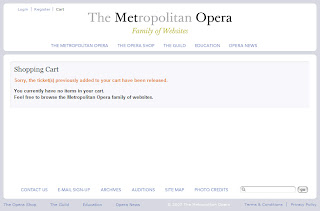Movies go to the opera
Is this some kind of joke?
It's now perfectly clear that Gockley's out to outGelb Gelb. But really, wtfffff is going on. (Meanwhile: people, can't Sieglinde get any rest?)A pilot program that features high-definition video viewing of close-up, mid-range and full stage ensemble shots of the performance on stage will be tested at every (SF Opera) Don Giovanni performance this summer. Two 6' by 9' retractable screens, complete with supertitles, will be hung from the ceiling on both sides of the balcony, offering patrons in the Balcony Front level and above a whole new way to experience opera.


















